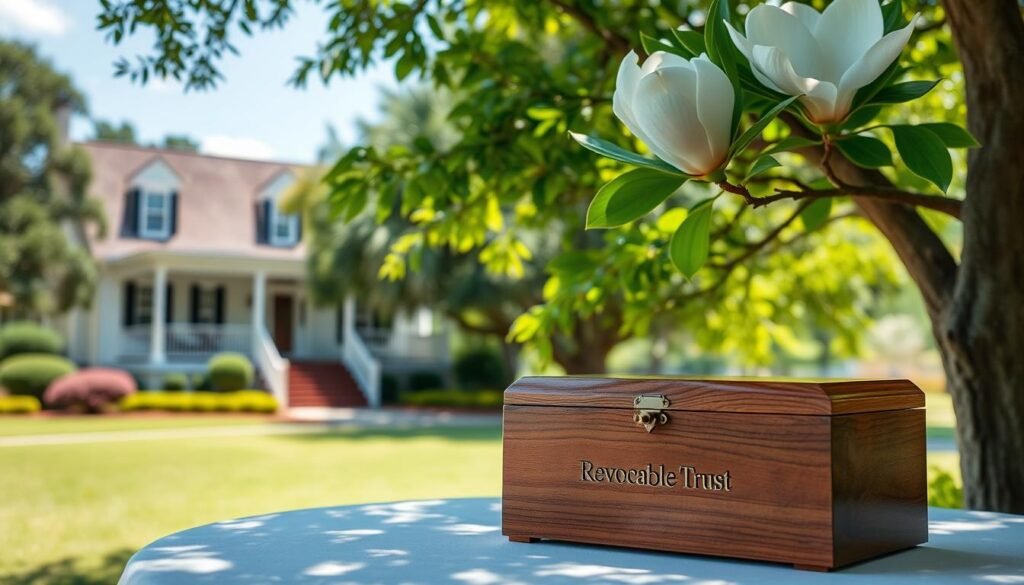In South Carolina, revocable trusts are key in estate planning. When the trustee dies, especially if they were also the grantor, big changes happen. These changes affect how the trust is managed and who benefits from it.
When a trustee dies, the trust usually becomes irrevocable. This change brings new tax rules and changes how the trust works. In South Carolina, it’s common for married couples to be co-trustees. This lets the surviving spouse handle finances without needing court approval if one dies.
It’s important to know South Carolina’s trust laws when a trustee dies. These laws help choose new trustees and tell them what to do. Successor trustees, named in the trust, take over to manage and carry out the trust’s wishes.
Key Takeaways
- Revocable trusts become irrevocable upon the grantor-trustee’s death
- Successor trustees take over trust management and administration
- South Carolina laws govern trustee succession and trust administration
- Married couples often act as co-trustees in South Carolina
- Trust documents typically outline procedures for determining grantor incapacity
- Trustees must keep trust assets separate from personal assets
- Consulting an attorney is advised for proper handling of trust matters after grantor’s death
Understanding Revocable Trusts in South Carolina
Revocable trusts are key in estate planning for South Carolina folks. They give you control over your assets while you’re alive and after you pass away.
Definition and Purpose of Revocable Trusts
A revocable trust is set up by you during your lifetime. It lets you change or cancel it anytime. Its main goal is to manage your assets smoothly without probate.
Key Components of a Revocable Trust
Here are the main parts of a revocable trust:
- Grantor: The person who creates and funds the trust
- Trustee: Manages trust assets and follows distribution instructions
- Beneficiaries: Individuals who receive trust benefits
- Trust document: Outlines terms and conditions

Role of the Trustee in South Carolina Revocable Trusts
The trustee in South Carolina handles trust assets and follows the trust’s rules. They can make withdrawals, sell property, and do other tasks allowed by the trust. Remember, using trust funds for personal gain is a big no-no.
Usually, the person who sets up the trust is the first trustee. When they can’t manage it anymore, a new trustee takes over. This ensures the trust keeps running smoothly and assets get to the right people.
Legal Ownership of Property in Revocable Trusts
Revocable trusts are key in estate planning in South Carolina. They help manage property and offer unique benefits. Let’s look at how these trusts work and who has legal rights to the assets.
Grantor’s Retained Ownership During Lifetime
In a revocable trust, the grantor controls the assets while alive. They can change the trust, add or remove property, or cancel it. The grantor often acts as the first trustee, managing the assets as they wish.
Trustee’s Legal Title and Responsibilities
The trustee has legal title to the trust property. This role comes with big responsibilities in revocable trust management. Trustees must act for the best of the beneficiaries and follow the trust’s rules. They can take out money and sell property, but not for personal gain.

Beneficiary Rights in South Carolina Revocable Trusts
Beneficiaries have certain rights in revocable trusts. They can get distributions as the trust document says. Knowing the roles of Trustees and Power of Attorneys is key for estate planning in South Carolina. While the grantor is alive, beneficiaries have limited rights because the trust is revocable.
| Entity | Rights and Responsibilities |
|---|---|
| Grantor | Retains ownership, can modify or revoke trust |
| Trustee | Holds legal title, manages assets, fiduciary duties |
| Beneficiary | Receives distributions, limited rights during grantor’s lifetime |
The trustee powers in revocable trusts are important but have strict rules. Understanding these roles well ensures the trust runs smoothly and protects everyone involved.
What Happens to Revocable Trust When Trustee Dies in South Carolina
The death of a trustee in South Carolina sets off a chain of events for a revocable trust. The named successor trustee then takes over. This change is key to keeping the trust running smoothly and achieving its goals.
In South Carolina, the new trustee’s job is to manage the trust’s assets. They must follow the trust document’s instructions. This might mean giving out assets to beneficiaries or managing the trust for a while longer.
It’s worth noting that if the trustor and trustee are not the same person, the trust keeps going after the trustor dies. The new trustee must stick to the trust’s rules for handling and distributing assets.
| Event | Action |
|---|---|
| Death of Trustee | Successor trustee assumes control |
| Trust Distribution | Assets distributed or trust continued |
| Trustor’s Death | Trust continues if trustor and trustee differ |
Handling these duties can be tricky. In South Carolina, executors have clear time limits and tasks. For example, they have 10 years from the date of death to start probate. This gives them enough time to get everything ready and manage the trust’s affairs well.
Successor Trustee Appointment and Responsibilities
Choosing a successor trustee is key for a smooth trust process. In South Carolina, most trusts have the settlor as the first trustee. A successor is named to take over when needed. Let’s look at what this role entails.
Importance of Naming a Successor Trustee
A successor trustee keeps the trust running smoothly. They step in if the original trustee can’t serve due to death, illness, or resignation. This move prevents delays and keeps the beneficiaries’ interests safe.
Process of Successor Trustee Assumption of Duties
When a trustee dies, the successor can take over without needing court approval. They must quickly tell the beneficiaries and start managing the trust assets. This includes making an inventory, paying bills, and preparing for asset distribution.
Legal Obligations of the Successor Trustee in South Carolina
Successor trustee duties are big. They must act in the best interest of the beneficiaries, follow the trust’s rules, and manage assets wisely. Key tasks include:
- Notifying creditors and settling debts
- Filing tax returns
- Appraising trust assets
- Overseeing trust assets distribution
| Task | Timeframe | Importance |
|---|---|---|
| Meet with estate planning attorney | Within few weeks | High |
| Notify beneficiaries | Promptly | Critical |
| Take control of assets | Immediately | Essential |
| Obtain asset appraisals | As soon as possible | Important |
Successor trustees are vital in trust administration. Their quick actions and careful management ensure the right distribution of trust assets. This protects the interests of the beneficiaries.
Trust Administration After Trustee’s Death in South Carolina
When a trustee dies in South Carolina, the trust’s management changes. A new trustee takes over to handle the trust’s assets and carry out its goals. This involves several important steps to keep the trust running smoothly.
The new trustee’s first job is to find and value all trust assets. They need to collect financial records, property deeds, and investment accounts. Then, they pay any debts and taxes the trust owes.
After paying these bills, the trustee gives out the remaining assets to the trust’s beneficiaries. The trust might end once all assets are given out. But, if the trust document says so, it can keep going under the new trustee’s care.
South Carolina law makes it easier to settle a trust without going to court. This is different from probate.
- Identify and value trust assets
- Pay debts and taxes
- Distribute remaining assets to beneficiaries
- Determine if trust terminates or continues
The South Carolina Probate Code helps guide trust administration. It applies to trusts made before, on, or after January 1, 2014. This ensures trusts are handled the same way, even as laws change. Successor trustees often get help from legal, accounting, and investment experts to handle trust administration well.
South Carolina Laws Governing Revocable Trusts and Trustee Succession
South Carolina’s trust laws are detailed in the South Carolina Trust Code. This code sets a clear framework for trust administration and beneficiary rights. It makes sure trusts run smoothly and fairly for everyone involved.
Relevant South Carolina Statutes
The South Carolina Trust Code is part of the state’s Probate Code, found in Title 62. It deals with many trust management aspects, including:
- Trust creation and validity
- Trustee duties and powers
- Trust beneficiary rights
- Trust modification and termination
Court Involvement in Trustee Succession
Usually, trustee succession in South Carolina doesn’t need court help. The trust document usually says how to choose a new trustee. This makes the process private and efficient for revocable living trusts in South Carolina.
Legal Protections for Beneficiaries
The South Carolina Trust Code gives strong protections to trust beneficiaries. These include:
- The right to receive information about trust administration
- The ability to request trust accountings
- The power to petition the court if a trustee breaches their fiduciary duty
It’s important for both trustees and beneficiaries to know these laws. This ensures proper trust management and protects their rights under South Carolina law.
Conclusion
Revocable trust management is key in estate planning in South Carolina. We’ve looked into what happens when a trustee passes away. This is crucial for protecting assets and loved ones.
About 70% of people want an estate plan. Knowing how to handle a revocable trust is vital. It helps in passing assets to beneficiaries without probate court.
Choosing a successor trustee is important. Only 30% of people know how to settle a trust after the trustee’s death. Estate plans with revocable trusts are 50% more likely to pass assets smoothly.
Successor trustees play a big role in managing trusts. They handle income and death taxes. It’s important to avoid legal issues by funding trusts properly.
For smooth trust administration, getting help from estate planning experts in South Carolina is crucial. They ensure assets are distributed correctly.

